AN INTRODUCTION
ICAR-National Research Centre on Camel, Bikaner, is a Premier Research Centre of the Indian Council of Agricultural Research (ICAR) which is an autonomous organisation under the Department of Agricultural Research and Education, Ministry of Agriculture and Farmers Welfare, Government of India.
The camel is an important animal component of the fragile desert eco-system. With its unique bio-physiological characteristics, the camel has become an icon of adaptation to challenging ways of living in arid and semi-arid regions. The proverbial Ship of Desert earned its epithet on account of its indispensability as a mode of transportation and draught power in desert but the utilities are many and are subject to continuous social and economic changes. The camel has played a significant role in civil law and order, defense and battles from the ancient times till date. The world famous Ganga-Risala of erstwhile Bikaner State was accepted as Imperial Service Troup and participated in World War I and II. The camel helped the engineers while constructing the Indira Gandhi Canal in Western part of Rajasthan. Presently, the camel corps constitutes an important wing of Border Security Force of Indian Para-Military Services.
Considering the importance of camel in the socio-economic development of arid and semi-arid zones, the Government of India established a Project Directorate on Camel at Bikaner (India) on 5th July 1984 under aegis of Indian Council of Agricultural Research (ICAR) which was upgraded to National Research Centre on Camel (NRCC) on September 20, 1995.
Since the distribution of dromedary camels in India (516828 heads) is confined to the arid and semi-arid areas of North-western India spread out in parts of Rajasthan, Gujarat and Haryana, the NRCC is focusing on basic and applied research on one humped camel (Camelus dromedarius). The center is also focusing issues of double humped camel (Camelus bactrianus) found in the cold desert of Nubra Valley of Laddakh region.
Tourist information
The Centre has been identified as one of the important tourist place of Bikaner and is included in the tourist book. The tourist visiting the Centre can see the camel of different breeds and their behaviour. A camel museum is available to apprise them of the developmental and research aspects of the camel in the desert ecosystem. Facilities of camel riding, safari and video/photography are available for the visitors. Camel milk parlour is a special attraction because it vendors unique value added camel milk products like ice-cream, hot and cold beverages. Every year thousands of Foreign and Indian Tourists visit the Centre.
Tourists can visit designated places only at the Centre. They are not allowed to visit any laboratory, animal premises and to interact with the Scientists without prior permission.
NRCC owns no resposibility on quality of goods sold in the rented shop of its premises.
As per the guidelines of the Government of India/Rajasthan, Only those tourists can visit who have received both the doses of the corona vaccine.

